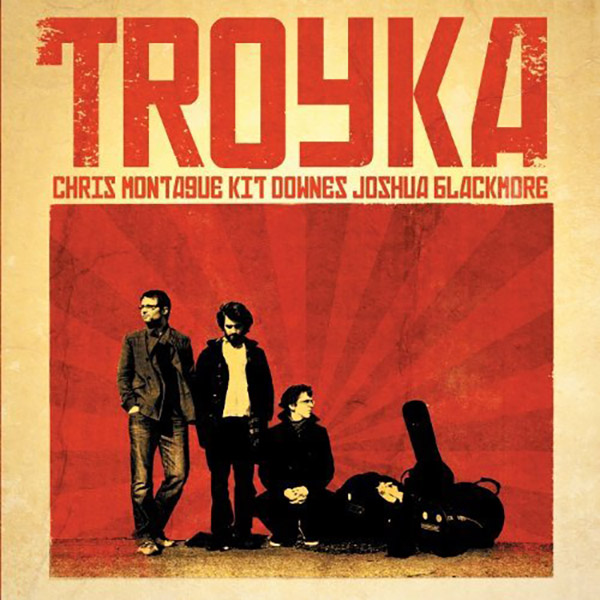
by Ian Mann
July 06, 2009
/ ALBUM
An album of tremendous promise
Troyka are an exciting young trio based in London who combine the improvisational qualities of jazz with rock dynamics and effects. They cite key improvisers such as saxophonist Tim Berne and guitarist Wayne Krantz as two major influences alongside the arguably less obvious Aphex Twin.
Troyka are into sonic exploration in a framework that embraces both jazz and rock. Guitarist Chris Montague is the group’s main composer with organist Kit Downes also contributing to the writing process. Talented young drum tyro Joshua Blackmore completes the group.
Montague is a new name to me but Downes and Blackmore have already established their jazz credentials through their work with pianist Tom Cawley. Downes is also a member of saxophonist James Allsopp’s Golden Age of Steam and was previously with the much lauded Empirical.
Troyka sound nothing like either Cawley’s Curios or Empirical both of whom are more conventionally “jazzy” but they do share characteristics with Allsopp’s band through Downes’ use of organ, an uncompromising contemporary approach and a commitment to improvisation.
The music on Troyka’s début album owes little to the hard bop guitar/organ combos of the fifties and sixties. As befits a trio “Born In The 80’s” (as one of their titles has it) their sound is much more contemporary. There’s a hint of Tony Williams Lifetime or maybe one of John Abercrombie’s groups-the guitarist has worked regularly with organists- but essentially Troyka have come up with something pretty original. Recorded by Robert Harder the press release recommends that the album be played loud.
This début album stands up remarkably well to repeated listening. Montague and Downes have come up with some memorable tunes, grooves and riffs. Even the trio’s quieter moments, which can come over as longueurs in concert work well on record adding contrast and texture to the album as a whole.
The trio kick off the album with Montague’s “Tax Return”, a powerful statement of intent full of hip hop grooves and crashing power chords but filtered through the jazz sensibilities of improvising musicians.
Even better is the sinister slide guitar driven “Clint” also by Montague, a glorious piece of sonic mayhem that brings the sound of the bottleneck guitar wailing into the 21st century. This blending of traditional virtues with contemporary ideas gives a good idea of what Troyka are all about. They’re taking their jazz education plus all their other influences, musical and otherwise, and are trying to do something modern and inventive with it all, more power to their collective elbow I say.
Montague’s brief “140” is an enjoyable groove laden snapshot that stays around long enough to be interesting. The group manage to fit a lot into one and a half minutes or so. The piece acts as a bridge to Downes’ impressionistic “Golden”, a kind of ambient tone poem that demonstrates that the band are not all bluff and bluster.
The following “Bear”, also by Downe’s combines the ambient approach with some jagged riffing from Montague plus some freer passages that sound like pure improvisation.
For all their modernity Troyka’s music sometimes recalls 70’s prog rock especially on tracks such as “Cajoch” and “Born In The 80’s”. On the latter Downes’ organ playing always reminds me of Dave Stewart of Egg. Blackmore’s use of unusual time signatures is another factor-Stewart and his colleagues were always big on those. It’s entirely possible that Downes and his colleagues have never heard of Egg or any of their contemporaries at all. In the best tradition of jazz serendipity they’ve ended up in a similar place via a very different route. The prog comparison is not intended to be in any way pejorative. There was some fine music made under that banner, I grew up with it and without doubt it helped to make me an adventurous listener, as I hope I still am today. It’s a shame that it was later quite so thoroughly discredited as a genre, I blame bombastic clowns like ELP for giving the music a bad name.
However I digress. Turning again to Troyka the darting, shape shifting “Twelve” and the similarly inclined “Noonian Song” are both highly impressive, the latter proving to be something of a crowd pleaser at the trio’s recent live show in Cardiff supporting Acoustic Ladyland (see review elsewhere on this site.)
Downes’ “Call” is a short, sharp riff and groove based piece that flirts fleetingly with orthodox funk rhythms. Montague is excellent again contributing another excellent solo. He combines old fashioned guitar attack a left field experimenter’s sensibility. The quietly spoken, bespectacled Montague follows in a grand tradition of intellectual, glasses wearing guitar heroes-think,Robert Fripp, Wayne Krantz, Bill Frisell. With his clever use of effects and distortion and general level of inventiveness he often sounds like an amalgam of them too. Downes seems to have attracted more column inches than Montague, largely due to his activities out side this trio, but in many ways Troyka is Montague’s band. His distinctive guitar sound is the group’s dominant voice and he is responsible for eight of the album’s eleven compositions. The album ends with his brief “Zeitgeist”, just over a minute and a half of ambient loopings.
“Troyka” is a success in it’s own right but it is also an album of tremendous promise. These talented young guys have the potential to become even better but this is still an auspicious début.